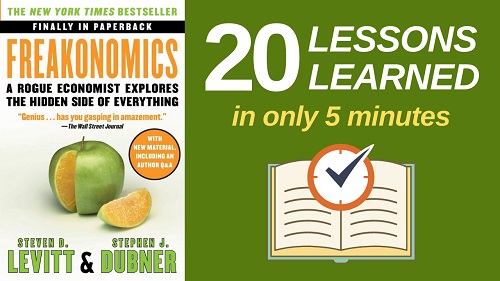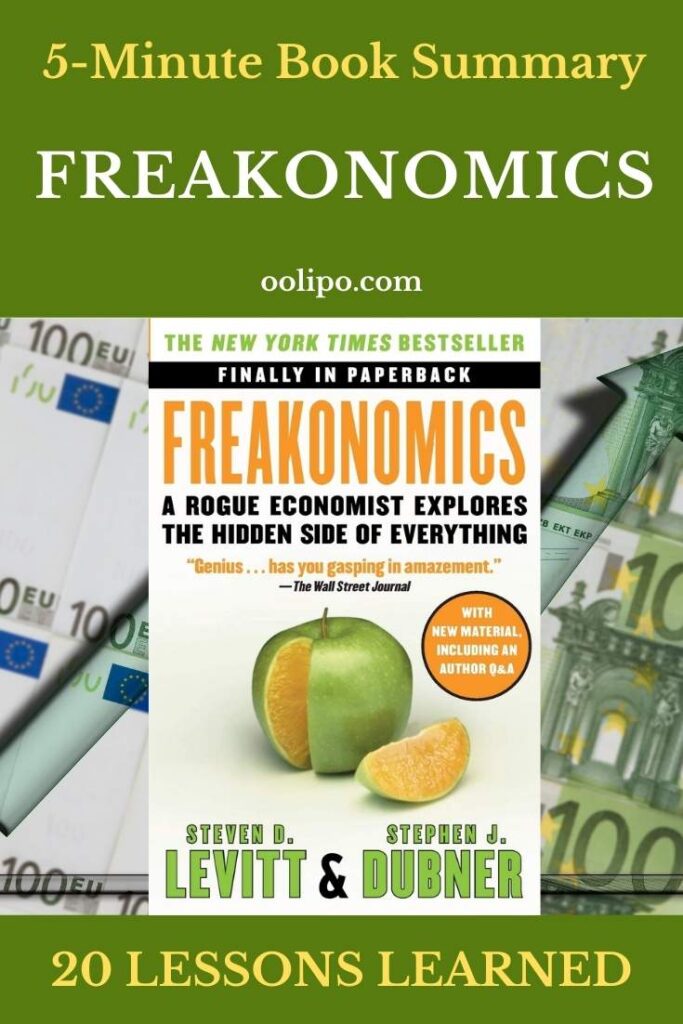Freakonomics: A Rogue Economist Explores the Hidden Side of Everything is a book of economic facts and opinions with real-life examples. Written by Stephan Levitt and Stephen J. Dubner. In this Freakonomics summary, we will dive deep into Levitt’s and Dubner’s takes on new economics.
For the PDF file of this book summary, please use the link at the bottom of this page.

Freakonomics Book Summary with 20 Lessons Learned
Here are the 20 lessons to learn from Freakonomics:
#1 There Is No Morality in Economics
Mathematics doesn’t care about your character. Business decisions are not made with emotions. You should work for whatever is most profitable for you. When you find better conditions, you should move in that direction. You have to work hard and be realistic to win. In the free market, no one will pity you. You have to get smarter without taking a big hit.
#2 Rewards and Goals
We can’t work with the same desire and desire all day long. But even if we act according to what we want, we cannot get what we want. Therefore, you can use small incentives as a source of instant motivation. But make sure that these incentives are not being used on you by others. Don’t let them exploit you.
#3 Money Motivation
Money is an incredible source of motivation. From the tiniest paycheck to the biggest sales deals, they’re incredible. It drags us along as if that is the only meaning of life.
#4 Socialization Motivation
Being admired, especially by the opposite sex, pushes you to emulate yourself. You try to be more well-groomed and better-looking. At the same time, being included in a good group of friends also triggers this motivation.
#5 Moral Motivation
This motivation, which is based on religious beliefs, affects us if we listen to the voice of our conscience. We have an urge to do what is moral, even when it conflicts with our interests. In particular, screens are also shown as exemplary behavior.
#6 Multiple Sources of Motivation
When these conditions are met, you are willing to do more or earn less. Places that offer you multiple motivations are more attractive. You want to have your work done there.
#7 Realtor Tactic
As people specialize in a field, they can abuse it for their benefit. To sell the house in a short time, a real estate agent praises the seller while vilifying the owner’s house. He quickly finds a middle ground and gets his commission. He does this so realistically that the person selling the house thinks that he is selling it high, and the person buying the house is buying it cheaply.
#8 Not Everything Is Connected
The human brain tends to make connections between sequential events to understand the issues. But that doesn’t mean that every successive event is related. The most classic example is that the rooster thinks the sun has risen because it crows. The sun will rise in the morning even if the rooster does not crow. Don’t always try to solve things by relating them.
#9 The Options Never End
People don’t like to see more than two options. Although it feels good to know that you have options, this does not give us an advantage as it will be harder to choose as the options increase. So don’t try to see all the options. Just know it’s there.
#10 How to Get Rich Quickly
One of the biggest mistakes in the world is trying to get rich quickly. If you act with this desire, you will first fall into the hands of fraudsters. Because they know how to use your desire to get rich quickly and they make promises to you. You lose your money just in case there is a possibility. You start with small coins first, then you play bigger to save what you have given, but the result will be a disappointment.
#11 The Brutal Truths
There is a lot of moral debate about abortion. These debates do not seem to be over. However, there is a fact that the number of children in low-income families has gradually decreased. However, children with a high probability of being guilty were not born. The crime rate has dropped.
#12 Importance of Mom and Dad
Children of educated parents are also educated. This is a great opportunity for children. The child of a doctor’s parent is also likely to be successful. Even his failure can still be considered a good grade compared to children brought up in other families. He certainly leads an above-average life.
#13 Popular Names
Rich people give their children a name. This name becomes popular over time and the rich no longer give this name to their children. Wealthy families want the rare, not the popular. Not everyone is attractive to them.
#14 People Are Good
Since the number of people who do not commit crimes is millions of times more than those who commit crimes, we can say that statistically, people are good. Sometimes even the best person can try the wrong way for personal gain. But in general, we have no reason to shy away from people. We can say that the majority are truly moral.
#15 The Majority Doesn’t Know
We can say that what the majority of people know about economics and many other fields is wrong or insufficient. Otherwise, the rich would not be in the minority. Unfortunately, some truths most people will never learn. Wealthy families also don’t want this information to spread or for you to find out promptly. If you have received a tip in the stock market, it is an expired tip.
#16 Inconsistency
People tend to be consistent. If you tell a person how smart he is, he will always try to act and talk smart in your presence. But if this suggestion doesn’t come from outside and our interests are at stake, what we say and what we do may not match.
#17 Problems
Until the last day of our lives, we will have to solve many problems. Some of them will be difficult, but some of them are not as difficult as we thought, but we will give up at the beginning of the road because we convince ourselves that we cannot solve that problem.
#18 Incentive
The incentive is such a weapon that if you shoot at the right target with the right bullet, there is nothing you can’t do. People have weaknesses and expectations. If you learn to use them, you will gain a great advantage.
#19 How to Learn
It is not enough to read, memorize and repeat over and over to learn. The secret to learning is to practice.
#20 Our Identity
We have a self with which we define ourselves. As long as we act like the person we think we are, and we feel that people see us that way, we have peace of mind. But as we begin to be evaluated outside of this line, we feel like there is a problem. Although we cannot control the behavior of others towards us, we expect other people to treat us as if we are who we believe we are.
Top 10 Quotes from Freakonomics
1. “Decades of studies have shown that a child born into an adverse family environment is far more likely than other children to become a criminal.”
2. “It is one thing to muse about experts’ abusing their position and another to prove it. The best way to do so would be to measure how an expert treats you versus how he performs the same service for himself.”
3. “An incentive is simply a means of urging people to do more of a good thing and less of a bad thing. But most incentives don’t come about organically. Someone—an economist or a politician or a parent—has to invent them.”
4. “If you were to assume that many experts use their information to your detriment, you’d be right. Experts depend on the fact that you don’t have the information they do. Or that you are so befuddled by the complexity of their operation that you wouldn’t know what to do with the information if you had it.”
5. “An analysis of the language used in real-estate ads shows that certain words are powerfully correlated with the final sale price of a house. This doesn’t necessarily mean that labeling a house “well maintained” causes it to sell for less than an equivalent house.”
6. “For instance, men who say they want a long-term relationship do much better than men looking for an occasional lover. But women looking for an occasional lover do great.”
7. “The gulf between the information we publicly proclaim and the information we know to be true is often vast. (Or, put a more familiar way: we say one thing and do another.) This can be seen in personal relationships, in commercial transactions, and of course in politics.”
8. “After the relief had settled in, after people remembered how to go about their lives without the pressing fear of crime, there arose a natural question: just where did all those criminals go?”
9. “There was perhaps no more attractive theory than the belief that smart policing stops crime. It offered a set of bona fide heroes rather than simply a dearth of villains.”
10. “There is a clear pattern at play: once a name catches on among high-income, highly educated parents, it starts working its way down the socioeconomic ladder.”
Free PDF Download of Freakonomics Summary to Save or Print
We created a PDF file with the summary and quotes on this page for easy access: Download Freakonomics PDF Summary. If you want to buy the paperback version of the book, check out this page.
The Popular Interview with Steven Levitt and Stephen Dubner
Please share these important lessons by pinning this post to Pinterest.
